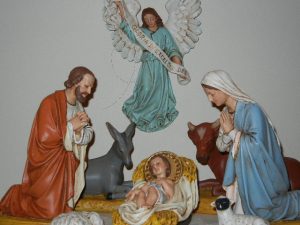Merry Christmas!
I wish to begin my reflection this evening / morning with a story, which seems to capture the event of the Incarnation:
Imagine a child’s sandbox. A young Dad is driving home from work. In the backyard, in the sandbox, are his little daughter, and her younger brother, (both of whom, incidentally, didn’t get naps today!)…And there’s a borrowed toy truck, a toddler’s shout, some angry and hurt feelings, and soon a tiny fistful of sand about to be hurled – when Daddy pulls into the driveway. He gently puts down his attaché case, quickly slips off his shoes and socks, as he rolls up pants legs, and steps into the sandbox to play, to the glee and transformation of two little ones. (Story courtesy of Fr. Jack Conley, C.P.)
Such is the Incarnation we celebrate this Holy Night / Morning…Love enters our mess and we are transformed! But rather than an adult coming to set us straight, a child is born, but not just any child.
This is the Child of Mary, Son of God, the Dawn from on High, Who breaks upon the scene of all humanity, to shine on us and to guide us into the way of peace. (Luke 1:79) Love has entered our human existence in a manner never before experienced since the beginning of time, to draw us once again into the very Love of God.
And what is our response? No doubt, it is pretty much the same over the past two thousand years…Salvation history reveals the goodness of God and the faithlessness of his people. God alone remains faithful. But is this not the source of our hope?
Let us look deeper into this mystery of the human experience. In reality, the human person is incomplete without God. Is it not the many erring ways of humanity looking to answer this “incompleteness” that is at the heart of our mess? Listen again to the wisdom of our Church Fathers of the Second Vatican Council:
In reality it is only in the mystery of the Word made flesh that the mystery of man truly becomes clear. For Adam, the first man, was a type of him who was to come, Christ the Lord, Christ the new Adam, in the very revelation of the mystery of the Father and of his love, fully reveals man to himself and brings to light his most high calling. (Gaudium et Spes #22)
Christ comes to us to restore what was lost: He comes to restore our image and likeness to God; He comes to restore right relationships among people. He comes to restore us to a proper relationship with God. He comes to restore the very breath of life; eternal life won for us through His death on a cross. In short, He comes to restore our human dignity.
The issue of human dignity has been very much at the heart of my prayer and study in recent weeks. As a result of that study, most of the following thoughts come from the teaching of the late, Pope John Paul II. Since there are many references to his various writings, I’ll not bother quoting all of them. I’ll simply give him credit for the majority of this homily. The specific quotes are noted in the text for those who bother to read this on line.
The Incarnation calls us to reflect upon the basic truths of the sanctity and dignity of all human life. This dignity includes the ability, and indeed, the necessity of every human person to live in communion with God, to live for the praise of God’s glory (Eph 1:12) striving to make each of his or her actions reflect the splendor of that glory. (Veritatis Splendor #10)
Our dignity is summed up in our call to holiness, which means to make a gift of our self to others and to God. (Evangelium Vitae #25) Basically, we have been given a sublime dignity based on an intimate bond which unites us to our Creator: in the human person there shines forth a reflection of God himself. (Evangelium Vitae #34) Christ is this intimate bond!
Coming to a deeper understanding of this human dignity, and its fundamental and necessary root in Christ, we must ask ourselves in the current world and culture, what is the consequence of forgetting God? When God is not acknowledged as God, the profound meaning of the human person is betrayed and communion between people is compromised. (Evangelium Vitae #36) To detach oneself from this truth is to condemn oneself to meaninglessness and unhappiness… (Evangelium Vitae #48) The logical conclusion to all of this can readily be seen. The further we remove God from our private and public life, the more injury is done to this human dignity, and to the fabric of society itself.
But, the opposite is also true. The more we live this call to root our lives in Christ, the more will we experience interior harmony, and the greater will be the harmony of each relationship, leading to greater experiences of love in every home until all of society is permeated with this transforming grace of God, the gift given and celebrated in the Incarnation.
My dear people, tonight / today, we celebrate the arrival of a precious Gift! God has humbled Himself to make of Himself a Gift to us in the person of Jesus Christ. This gift is freely given, and up to us to freely receive. The sign that we have truly received and incorporated this Gift into our lives is the evidence of our own lives given as gift in return. Let us give thanks to God for this precious Gift by giving ourselves in love to one another.
Love has stepped into the messiness of life through the Incarnation. May we be transformed by this Love, and may our love continue to transform our world into the Kingdom of God.
0